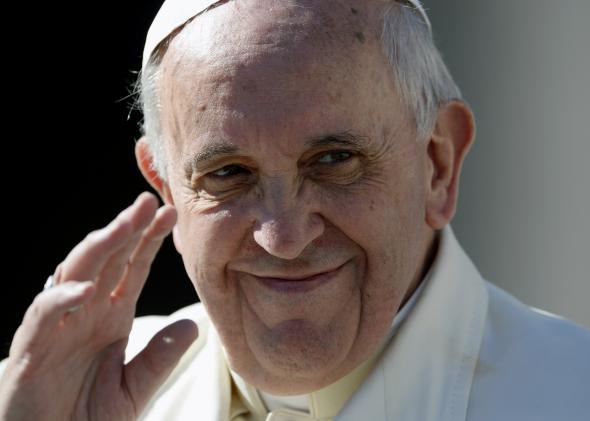In an interview with Italian newspaper Corriere della Sera that appeared today, Pope Francis suggests that some forms of civil unions may be tolerated by the Catholic Church. The pope acknowledged “diverse situations of cohabitation,” focusing his response on government recognition of nonmarital relationships, for example, where one party may need access to health care. This is the latest in a wave of statements many interpret as the Vatican softening its stance on homosexuality. Don’t be fooled. Francis is not the first pro-gay pope.
Pope Francis reinforced this impression in his response, when he said—-as he has always said—that “matrimony is between a man and a woman.” Despite the pope’s clear and consistent opposition to marriage equality, many media outlets broadcast misleading headlines, tantalizing the millions of liberal, gay-friendly, marriage-equality-supporting Catholics here in the United States. Earlier today, CNN’s homepage declared, “Pope opens door to same-sex unions.” Above a stock photo festooned with a rainbow flag, the Huffington Post said, “Pope Francis Suggests Gay Civil Unions May Be Tolerable.” Neither could be further from the truth.
The pope’s statement could easily be interpreted to mean the extension of legal rights to a caregiver living with a terminally ill loved one. Some civil unions also allow widows who wish to form a new romantic partnership to keep Social Security survivor’s benefits. To give you an idea of how slow things are moving here, this represents progress: Church leaders previously suggested that widows should “have consecrated to God their remaining years in the unmarried state.” Being exceedingly careful not to issue any errant endorsements of a loving commitment between same-sex partners, the pope only suggests that the Vatican should examine and evaluate the circumstances of governmentally recognized relationships.
Bigoted lawmakers in many U.S. jurisdictions used similar logic when drafting anti-marriage equality amendments during the mid-aughts. In 2006, focusing on the perceived illegitimacy of same-sex marriages, Virginia voters approved a referendum that prohibited the “[recognition of] a legal status for relationships of unmarried individuals that intends to approximate the design, qualities, significance, or effects of marriage.” In other words, lawmakers made sure that civil unions (including those entered into in other states) didn’t provide a backdoor method for recognizing same-sex partnerships. By denying the very legitimacy of certain relationships, one may also deny the legal rights associated with them. The Catholic Church uses the same logic today.
When Pope Francis reiterated his opposition to same-sex adoption back in December, Slate’s Mark Joseph Stern outlined some theories for why so many were hailing the pontiff as a progressive hero. Stern suggested that liberal Catholics were simply “reviving the old urge for acceptance.” Apparently, the Vatican is fully aware of that desire, having installed a charismatic, tactful, and generally likable pope after the public relations disaster they now call their Pope Emeritus. The church needed a media darling, and it put one into place.
While he may flub his words now and again, Francis’ message is consistent. He is quite capable of playing on popular sentiment in order to gain support. By acknowledging that gay people exist and are—wait for it—worthy of love, Pope Francis endeared himself to legions of followers who clung desperately to their faith through the Benedict years. By entertaining a discussion of gay rights—without ever endorsing them in any fashion—many see hope for acceptance of the LGBTQ community in the future. Upon close examination, though, the pope’s words are calculated, precise, and unforgiving. Same-sex families are not legitimate in the eyes of the Vatican. In the Catholic Church, gays—being humans—have inherent human rights. Gay rights, however, are not human rights.
